Comprehensive Analysis of Auditing: Expectation Gap and Appointment
VerifiedAdded on 2023/04/24
|9
|2022
|286
Report
AI Summary
This report provides a comprehensive analysis of various aspects of auditing, focusing on the audit expectation gap, which is defined as the difference between expected and actual auditor performance. It explores the benefits of auditing for companies like EML, including improved accounting systems, reliable financial information, and reduced data breaches. The report also discusses the legal requirements for audits in New Zealand, particularly under the Financial Reporting Act 2013, and examines the potential disadvantages of voluntary audits, such as increased costs and disclosure of confidential information. Furthermore, it outlines the key risks and issues to consider before accepting an audit engagement and details the necessary steps for auditor appointment, emphasizing compliance with XRB standards and ethical requirements. Desklib provides access to similar solved assignments and past papers for students.

Running head: AUDITING
Auditing
Name of the Student
Name of the University
Author’s Note
Auditing
Name of the Student
Name of the University
Author’s Note
Paraphrase This Document
Need a fresh take? Get an instant paraphrase of this document with our AI Paraphraser
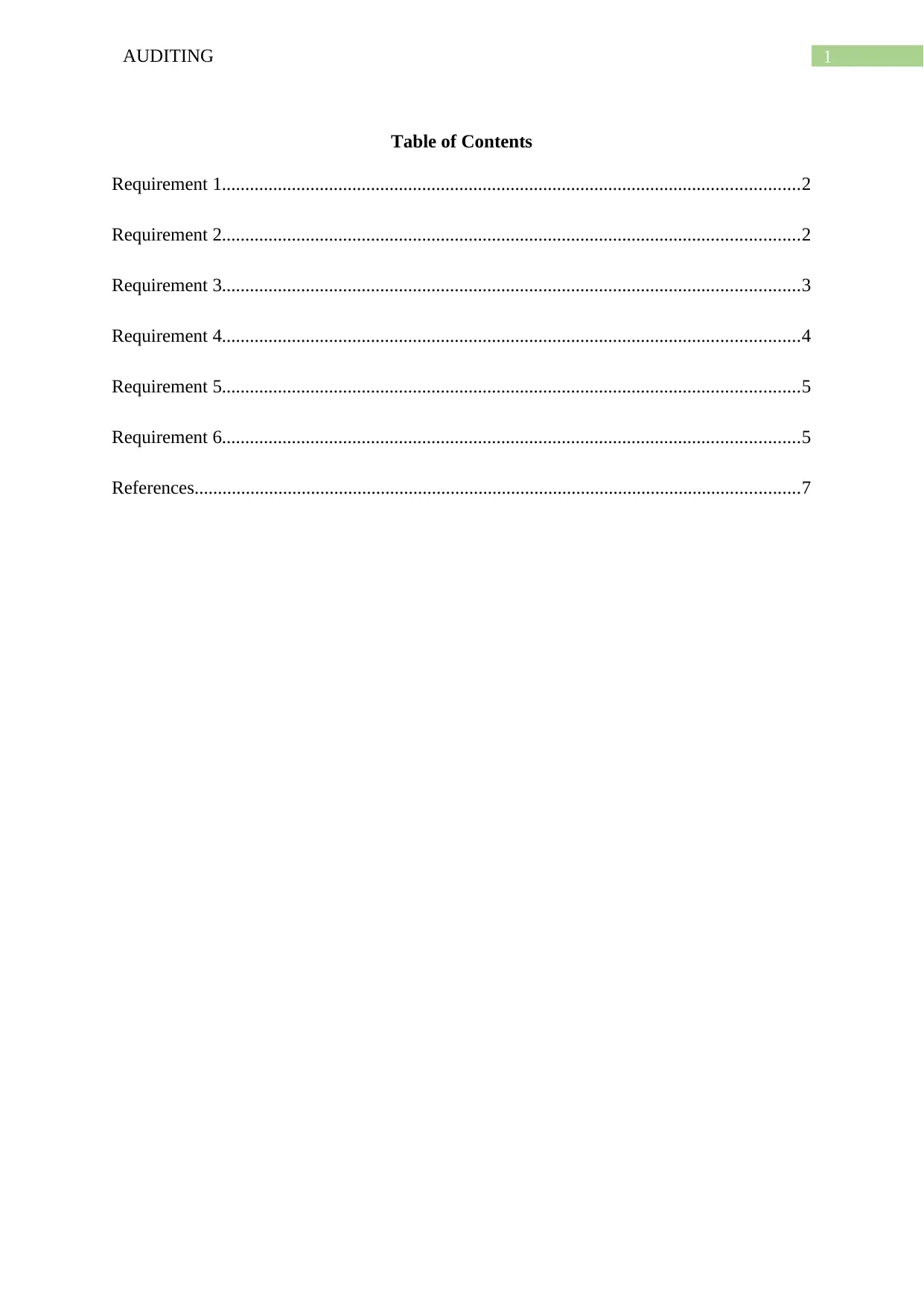
1AUDITING
Table of Contents
Requirement 1............................................................................................................................2
Requirement 2............................................................................................................................2
Requirement 3............................................................................................................................3
Requirement 4............................................................................................................................4
Requirement 5............................................................................................................................5
Requirement 6............................................................................................................................5
References..................................................................................................................................7
Table of Contents
Requirement 1............................................................................................................................2
Requirement 2............................................................................................................................2
Requirement 3............................................................................................................................3
Requirement 4............................................................................................................................4
Requirement 5............................................................................................................................5
Requirement 6............................................................................................................................5
References..................................................................................................................................7
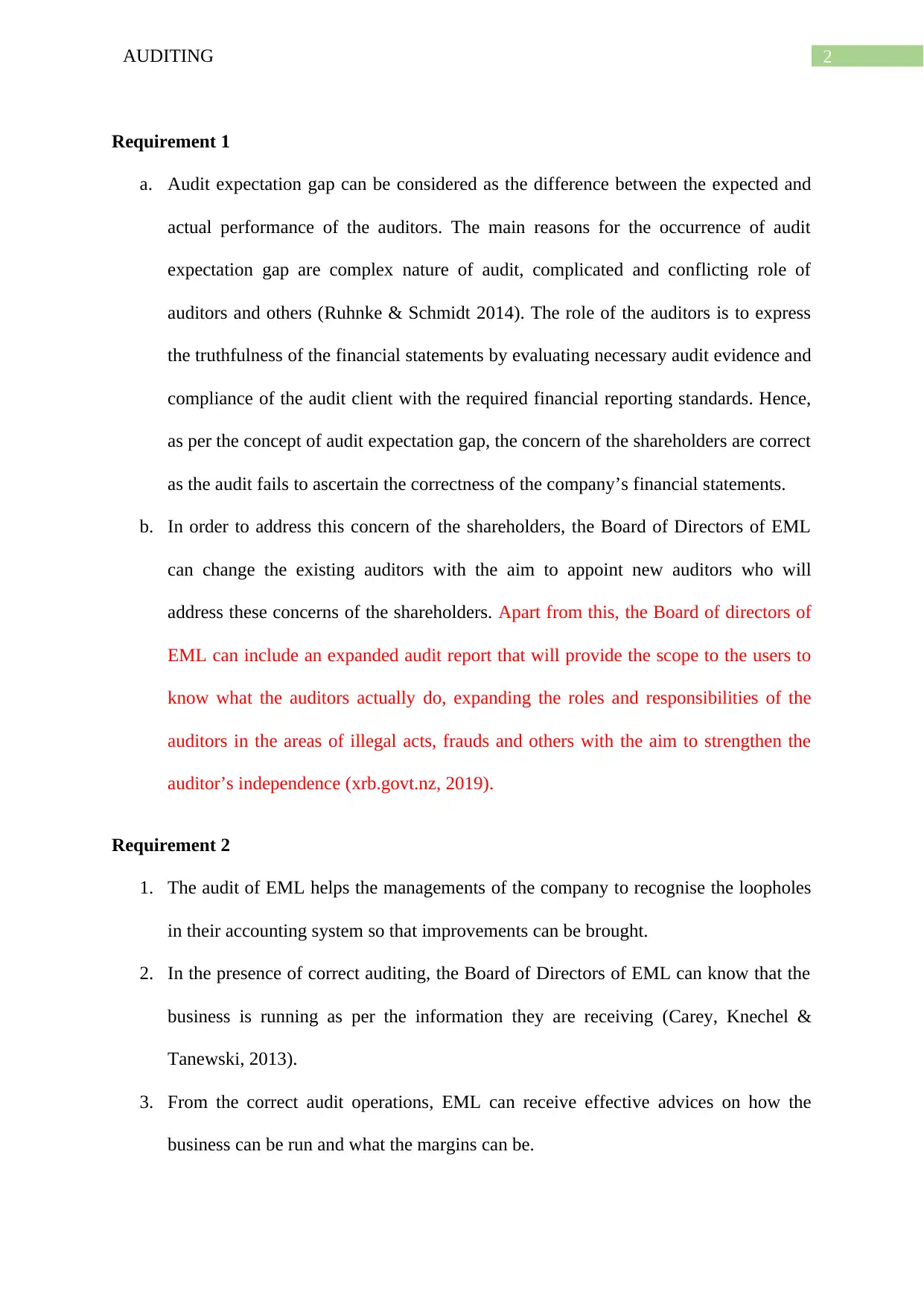
2AUDITING
Requirement 1
a. Audit expectation gap can be considered as the difference between the expected and
actual performance of the auditors. The main reasons for the occurrence of audit
expectation gap are complex nature of audit, complicated and conflicting role of
auditors and others (Ruhnke & Schmidt 2014). The role of the auditors is to express
the truthfulness of the financial statements by evaluating necessary audit evidence and
compliance of the audit client with the required financial reporting standards. Hence,
as per the concept of audit expectation gap, the concern of the shareholders are correct
as the audit fails to ascertain the correctness of the company’s financial statements.
b. In order to address this concern of the shareholders, the Board of Directors of EML
can change the existing auditors with the aim to appoint new auditors who will
address these concerns of the shareholders. Apart from this, the Board of directors of
EML can include an expanded audit report that will provide the scope to the users to
know what the auditors actually do, expanding the roles and responsibilities of the
auditors in the areas of illegal acts, frauds and others with the aim to strengthen the
auditor’s independence (xrb.govt.nz, 2019).
Requirement 2
1. The audit of EML helps the managements of the company to recognise the loopholes
in their accounting system so that improvements can be brought.
2. In the presence of correct auditing, the Board of Directors of EML can know that the
business is running as per the information they are receiving (Carey, Knechel &
Tanewski, 2013).
3. From the correct audit operations, EML can receive effective advices on how the
business can be run and what the margins can be.
Requirement 1
a. Audit expectation gap can be considered as the difference between the expected and
actual performance of the auditors. The main reasons for the occurrence of audit
expectation gap are complex nature of audit, complicated and conflicting role of
auditors and others (Ruhnke & Schmidt 2014). The role of the auditors is to express
the truthfulness of the financial statements by evaluating necessary audit evidence and
compliance of the audit client with the required financial reporting standards. Hence,
as per the concept of audit expectation gap, the concern of the shareholders are correct
as the audit fails to ascertain the correctness of the company’s financial statements.
b. In order to address this concern of the shareholders, the Board of Directors of EML
can change the existing auditors with the aim to appoint new auditors who will
address these concerns of the shareholders. Apart from this, the Board of directors of
EML can include an expanded audit report that will provide the scope to the users to
know what the auditors actually do, expanding the roles and responsibilities of the
auditors in the areas of illegal acts, frauds and others with the aim to strengthen the
auditor’s independence (xrb.govt.nz, 2019).
Requirement 2
1. The audit of EML helps the managements of the company to recognise the loopholes
in their accounting system so that improvements can be brought.
2. In the presence of correct auditing, the Board of Directors of EML can know that the
business is running as per the information they are receiving (Carey, Knechel &
Tanewski, 2013).
3. From the correct audit operations, EML can receive effective advices on how the
business can be run and what the margins can be.
⊘ This is a preview!⊘
Do you want full access?
Subscribe today to unlock all pages.

Trusted by 1+ million students worldwide
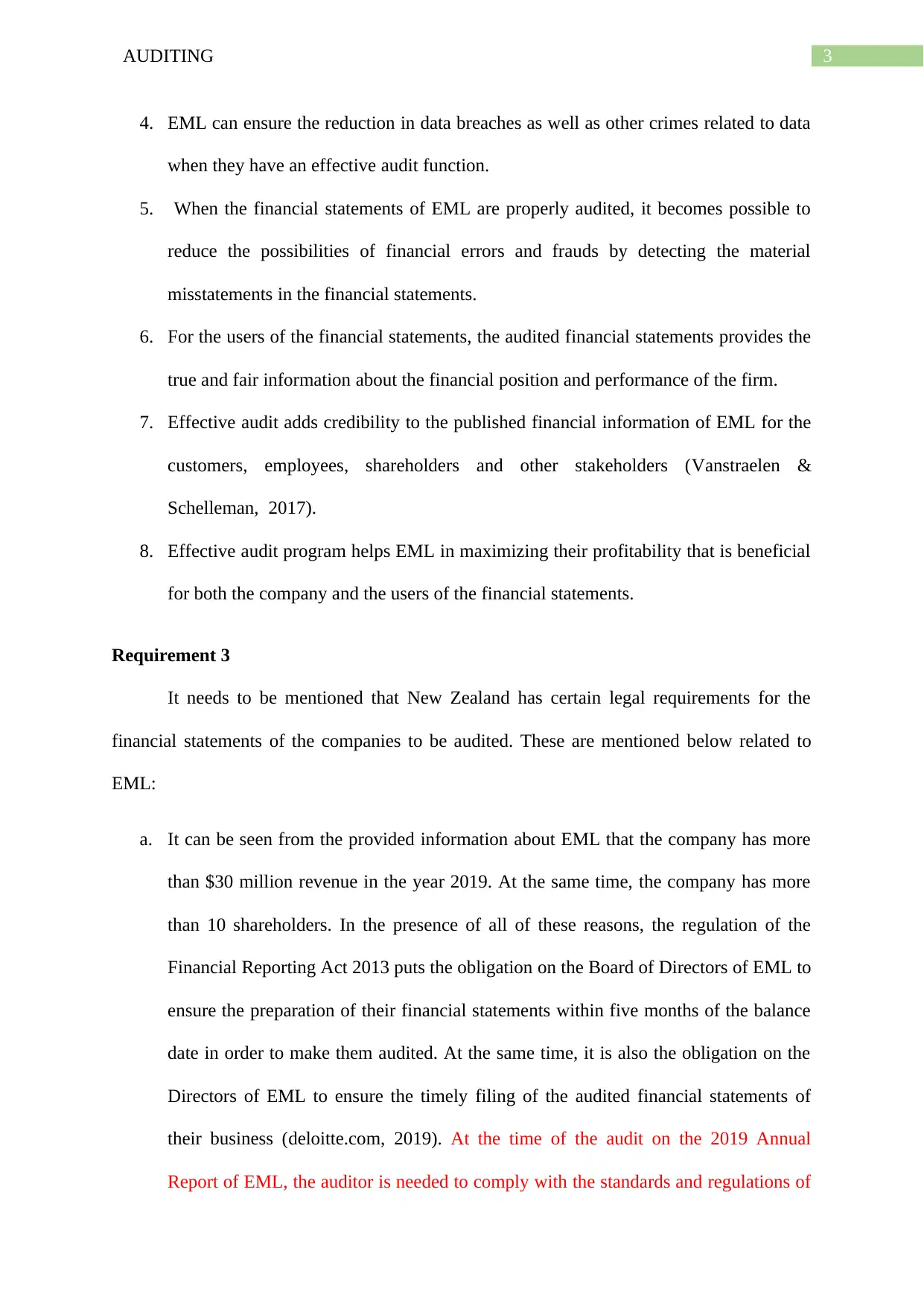
3AUDITING
4. EML can ensure the reduction in data breaches as well as other crimes related to data
when they have an effective audit function.
5. When the financial statements of EML are properly audited, it becomes possible to
reduce the possibilities of financial errors and frauds by detecting the material
misstatements in the financial statements.
6. For the users of the financial statements, the audited financial statements provides the
true and fair information about the financial position and performance of the firm.
7. Effective audit adds credibility to the published financial information of EML for the
customers, employees, shareholders and other stakeholders (Vanstraelen &
Schelleman, 2017).
8. Effective audit program helps EML in maximizing their profitability that is beneficial
for both the company and the users of the financial statements.
Requirement 3
It needs to be mentioned that New Zealand has certain legal requirements for the
financial statements of the companies to be audited. These are mentioned below related to
EML:
a. It can be seen from the provided information about EML that the company has more
than $30 million revenue in the year 2019. At the same time, the company has more
than 10 shareholders. In the presence of all of these reasons, the regulation of the
Financial Reporting Act 2013 puts the obligation on the Board of Directors of EML to
ensure the preparation of their financial statements within five months of the balance
date in order to make them audited. At the same time, it is also the obligation on the
Directors of EML to ensure the timely filing of the audited financial statements of
their business (deloitte.com, 2019). At the time of the audit on the 2019 Annual
Report of EML, the auditor is needed to comply with the standards and regulations of
4. EML can ensure the reduction in data breaches as well as other crimes related to data
when they have an effective audit function.
5. When the financial statements of EML are properly audited, it becomes possible to
reduce the possibilities of financial errors and frauds by detecting the material
misstatements in the financial statements.
6. For the users of the financial statements, the audited financial statements provides the
true and fair information about the financial position and performance of the firm.
7. Effective audit adds credibility to the published financial information of EML for the
customers, employees, shareholders and other stakeholders (Vanstraelen &
Schelleman, 2017).
8. Effective audit program helps EML in maximizing their profitability that is beneficial
for both the company and the users of the financial statements.
Requirement 3
It needs to be mentioned that New Zealand has certain legal requirements for the
financial statements of the companies to be audited. These are mentioned below related to
EML:
a. It can be seen from the provided information about EML that the company has more
than $30 million revenue in the year 2019. At the same time, the company has more
than 10 shareholders. In the presence of all of these reasons, the regulation of the
Financial Reporting Act 2013 puts the obligation on the Board of Directors of EML to
ensure the preparation of their financial statements within five months of the balance
date in order to make them audited. At the same time, it is also the obligation on the
Directors of EML to ensure the timely filing of the audited financial statements of
their business (deloitte.com, 2019). At the time of the audit on the 2019 Annual
Report of EML, the auditor is needed to comply with the standards and regulations of
Paraphrase This Document
Need a fresh take? Get an instant paraphrase of this document with our AI Paraphraser
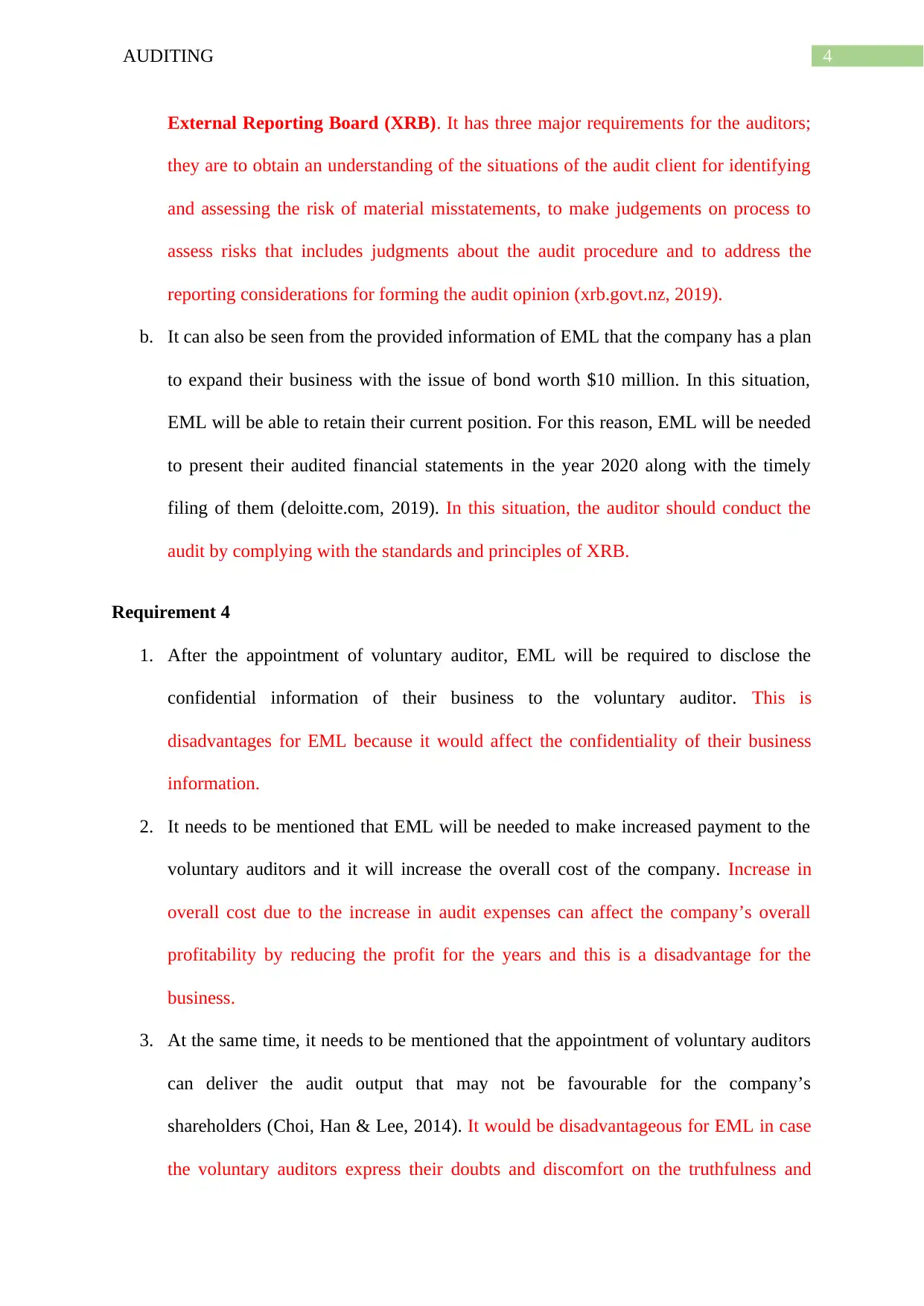
4AUDITING
External Reporting Board (XRB). It has three major requirements for the auditors;
they are to obtain an understanding of the situations of the audit client for identifying
and assessing the risk of material misstatements, to make judgements on process to
assess risks that includes judgments about the audit procedure and to address the
reporting considerations for forming the audit opinion (xrb.govt.nz, 2019).
b. It can also be seen from the provided information of EML that the company has a plan
to expand their business with the issue of bond worth $10 million. In this situation,
EML will be able to retain their current position. For this reason, EML will be needed
to present their audited financial statements in the year 2020 along with the timely
filing of them (deloitte.com, 2019). In this situation, the auditor should conduct the
audit by complying with the standards and principles of XRB.
Requirement 4
1. After the appointment of voluntary auditor, EML will be required to disclose the
confidential information of their business to the voluntary auditor. This is
disadvantages for EML because it would affect the confidentiality of their business
information.
2. It needs to be mentioned that EML will be needed to make increased payment to the
voluntary auditors and it will increase the overall cost of the company. Increase in
overall cost due to the increase in audit expenses can affect the company’s overall
profitability by reducing the profit for the years and this is a disadvantage for the
business.
3. At the same time, it needs to be mentioned that the appointment of voluntary auditors
can deliver the audit output that may not be favourable for the company’s
shareholders (Choi, Han & Lee, 2014). It would be disadvantageous for EML in case
the voluntary auditors express their doubts and discomfort on the truthfulness and
External Reporting Board (XRB). It has three major requirements for the auditors;
they are to obtain an understanding of the situations of the audit client for identifying
and assessing the risk of material misstatements, to make judgements on process to
assess risks that includes judgments about the audit procedure and to address the
reporting considerations for forming the audit opinion (xrb.govt.nz, 2019).
b. It can also be seen from the provided information of EML that the company has a plan
to expand their business with the issue of bond worth $10 million. In this situation,
EML will be able to retain their current position. For this reason, EML will be needed
to present their audited financial statements in the year 2020 along with the timely
filing of them (deloitte.com, 2019). In this situation, the auditor should conduct the
audit by complying with the standards and principles of XRB.
Requirement 4
1. After the appointment of voluntary auditor, EML will be required to disclose the
confidential information of their business to the voluntary auditor. This is
disadvantages for EML because it would affect the confidentiality of their business
information.
2. It needs to be mentioned that EML will be needed to make increased payment to the
voluntary auditors and it will increase the overall cost of the company. Increase in
overall cost due to the increase in audit expenses can affect the company’s overall
profitability by reducing the profit for the years and this is a disadvantage for the
business.
3. At the same time, it needs to be mentioned that the appointment of voluntary auditors
can deliver the audit output that may not be favourable for the company’s
shareholders (Choi, Han & Lee, 2014). It would be disadvantageous for EML in case
the voluntary auditors express their doubts and discomfort on the truthfulness and
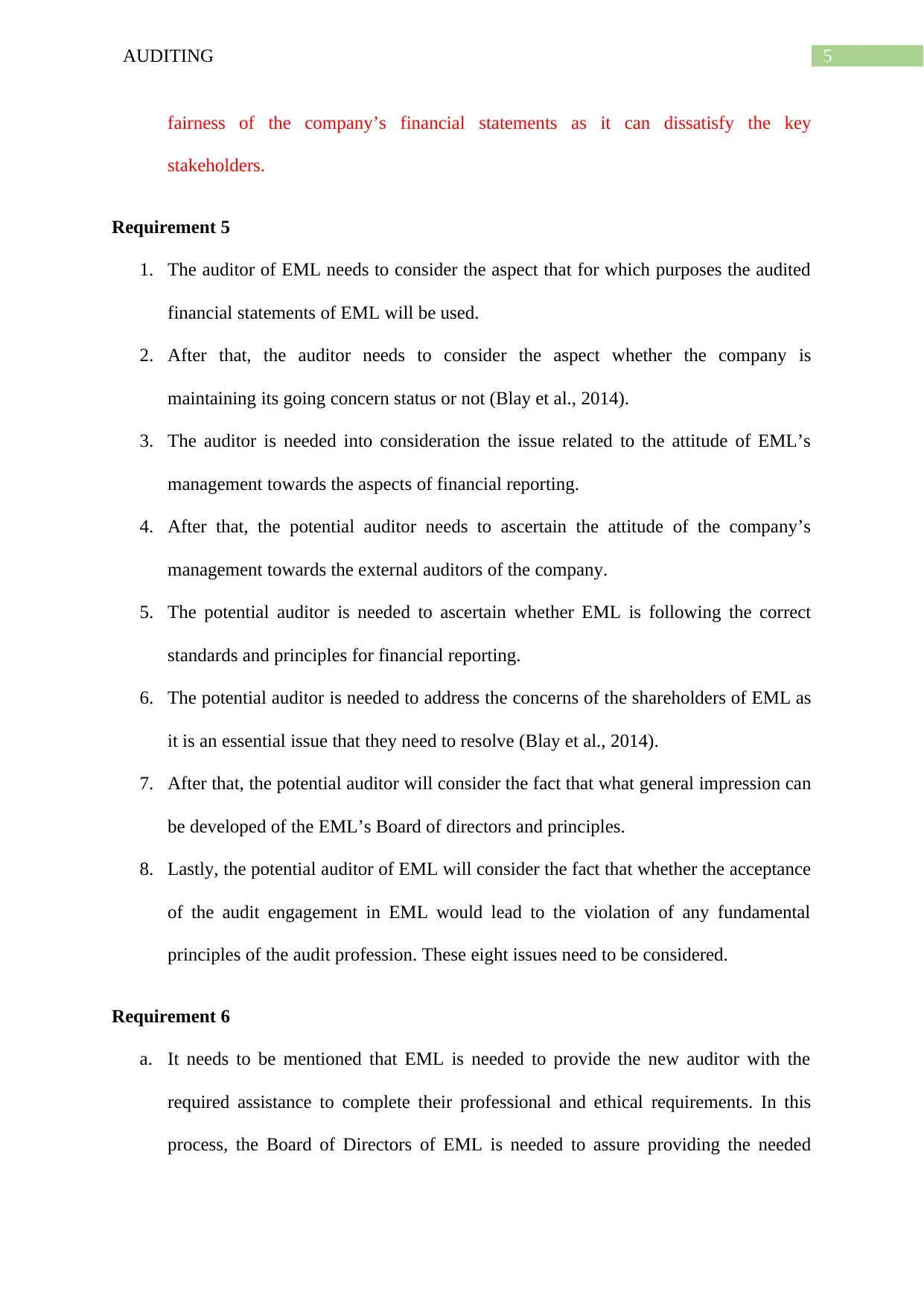
5AUDITING
fairness of the company’s financial statements as it can dissatisfy the key
stakeholders.
Requirement 5
1. The auditor of EML needs to consider the aspect that for which purposes the audited
financial statements of EML will be used.
2. After that, the auditor needs to consider the aspect whether the company is
maintaining its going concern status or not (Blay et al., 2014).
3. The auditor is needed into consideration the issue related to the attitude of EML’s
management towards the aspects of financial reporting.
4. After that, the potential auditor needs to ascertain the attitude of the company’s
management towards the external auditors of the company.
5. The potential auditor is needed to ascertain whether EML is following the correct
standards and principles for financial reporting.
6. The potential auditor is needed to address the concerns of the shareholders of EML as
it is an essential issue that they need to resolve (Blay et al., 2014).
7. After that, the potential auditor will consider the fact that what general impression can
be developed of the EML’s Board of directors and principles.
8. Lastly, the potential auditor of EML will consider the fact that whether the acceptance
of the audit engagement in EML would lead to the violation of any fundamental
principles of the audit profession. These eight issues need to be considered.
Requirement 6
a. It needs to be mentioned that EML is needed to provide the new auditor with the
required assistance to complete their professional and ethical requirements. In this
process, the Board of Directors of EML is needed to assure providing the needed
fairness of the company’s financial statements as it can dissatisfy the key
stakeholders.
Requirement 5
1. The auditor of EML needs to consider the aspect that for which purposes the audited
financial statements of EML will be used.
2. After that, the auditor needs to consider the aspect whether the company is
maintaining its going concern status or not (Blay et al., 2014).
3. The auditor is needed into consideration the issue related to the attitude of EML’s
management towards the aspects of financial reporting.
4. After that, the potential auditor needs to ascertain the attitude of the company’s
management towards the external auditors of the company.
5. The potential auditor is needed to ascertain whether EML is following the correct
standards and principles for financial reporting.
6. The potential auditor is needed to address the concerns of the shareholders of EML as
it is an essential issue that they need to resolve (Blay et al., 2014).
7. After that, the potential auditor will consider the fact that what general impression can
be developed of the EML’s Board of directors and principles.
8. Lastly, the potential auditor of EML will consider the fact that whether the acceptance
of the audit engagement in EML would lead to the violation of any fundamental
principles of the audit profession. These eight issues need to be considered.
Requirement 6
a. It needs to be mentioned that EML is needed to provide the new auditor with the
required assistance to complete their professional and ethical requirements. In this
process, the Board of Directors of EML is needed to assure providing the needed
⊘ This is a preview!⊘
Do you want full access?
Subscribe today to unlock all pages.

Trusted by 1+ million students worldwide
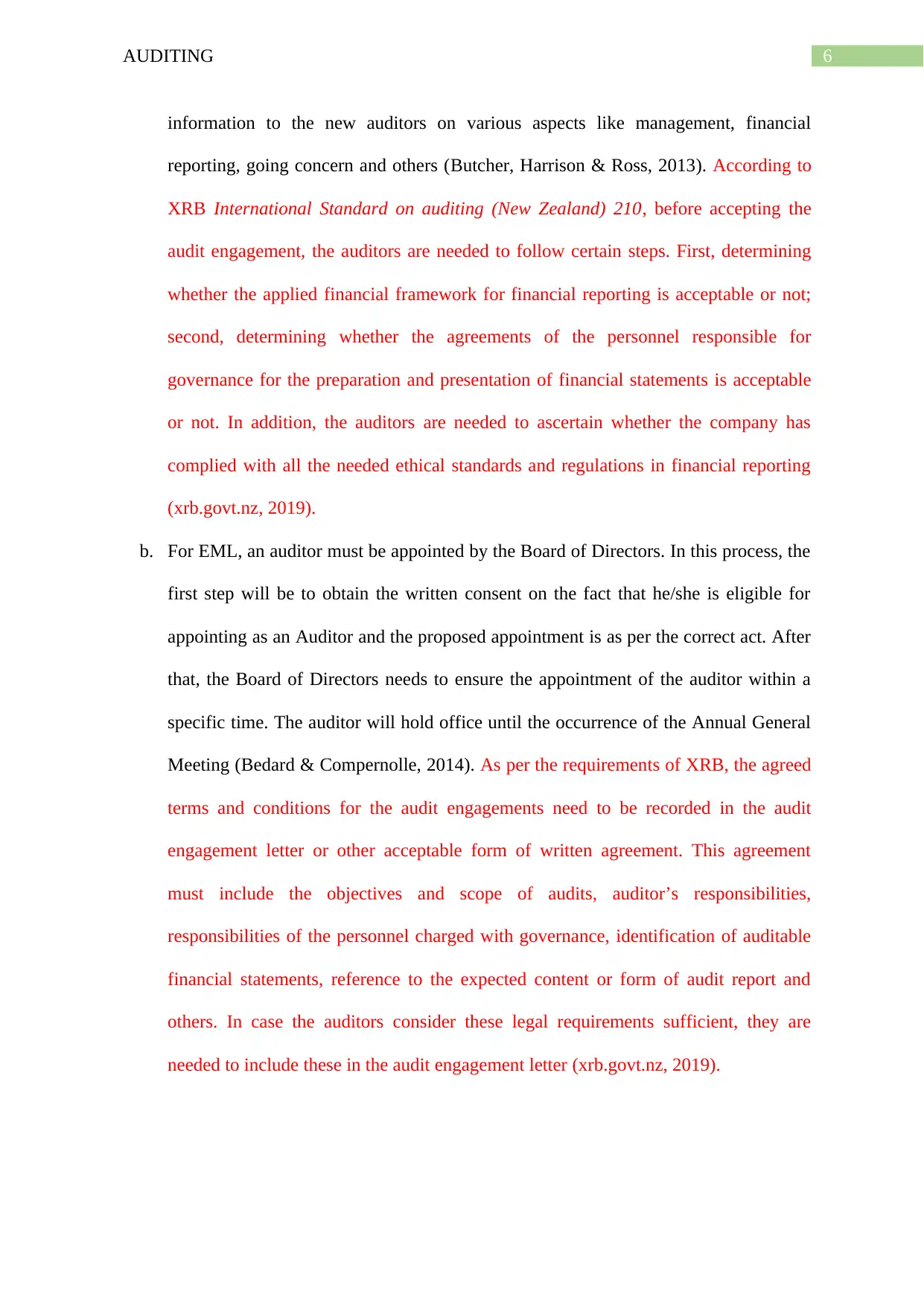
6AUDITING
information to the new auditors on various aspects like management, financial
reporting, going concern and others (Butcher, Harrison & Ross, 2013). According to
XRB International Standard on auditing (New Zealand) 210, before accepting the
audit engagement, the auditors are needed to follow certain steps. First, determining
whether the applied financial framework for financial reporting is acceptable or not;
second, determining whether the agreements of the personnel responsible for
governance for the preparation and presentation of financial statements is acceptable
or not. In addition, the auditors are needed to ascertain whether the company has
complied with all the needed ethical standards and regulations in financial reporting
(xrb.govt.nz, 2019).
b. For EML, an auditor must be appointed by the Board of Directors. In this process, the
first step will be to obtain the written consent on the fact that he/she is eligible for
appointing as an Auditor and the proposed appointment is as per the correct act. After
that, the Board of Directors needs to ensure the appointment of the auditor within a
specific time. The auditor will hold office until the occurrence of the Annual General
Meeting (Bedard & Compernolle, 2014). As per the requirements of XRB, the agreed
terms and conditions for the audit engagements need to be recorded in the audit
engagement letter or other acceptable form of written agreement. This agreement
must include the objectives and scope of audits, auditor’s responsibilities,
responsibilities of the personnel charged with governance, identification of auditable
financial statements, reference to the expected content or form of audit report and
others. In case the auditors consider these legal requirements sufficient, they are
needed to include these in the audit engagement letter (xrb.govt.nz, 2019).
information to the new auditors on various aspects like management, financial
reporting, going concern and others (Butcher, Harrison & Ross, 2013). According to
XRB International Standard on auditing (New Zealand) 210, before accepting the
audit engagement, the auditors are needed to follow certain steps. First, determining
whether the applied financial framework for financial reporting is acceptable or not;
second, determining whether the agreements of the personnel responsible for
governance for the preparation and presentation of financial statements is acceptable
or not. In addition, the auditors are needed to ascertain whether the company has
complied with all the needed ethical standards and regulations in financial reporting
(xrb.govt.nz, 2019).
b. For EML, an auditor must be appointed by the Board of Directors. In this process, the
first step will be to obtain the written consent on the fact that he/she is eligible for
appointing as an Auditor and the proposed appointment is as per the correct act. After
that, the Board of Directors needs to ensure the appointment of the auditor within a
specific time. The auditor will hold office until the occurrence of the Annual General
Meeting (Bedard & Compernolle, 2014). As per the requirements of XRB, the agreed
terms and conditions for the audit engagements need to be recorded in the audit
engagement letter or other acceptable form of written agreement. This agreement
must include the objectives and scope of audits, auditor’s responsibilities,
responsibilities of the personnel charged with governance, identification of auditable
financial statements, reference to the expected content or form of audit report and
others. In case the auditors consider these legal requirements sufficient, they are
needed to include these in the audit engagement letter (xrb.govt.nz, 2019).
Paraphrase This Document
Need a fresh take? Get an instant paraphrase of this document with our AI Paraphraser
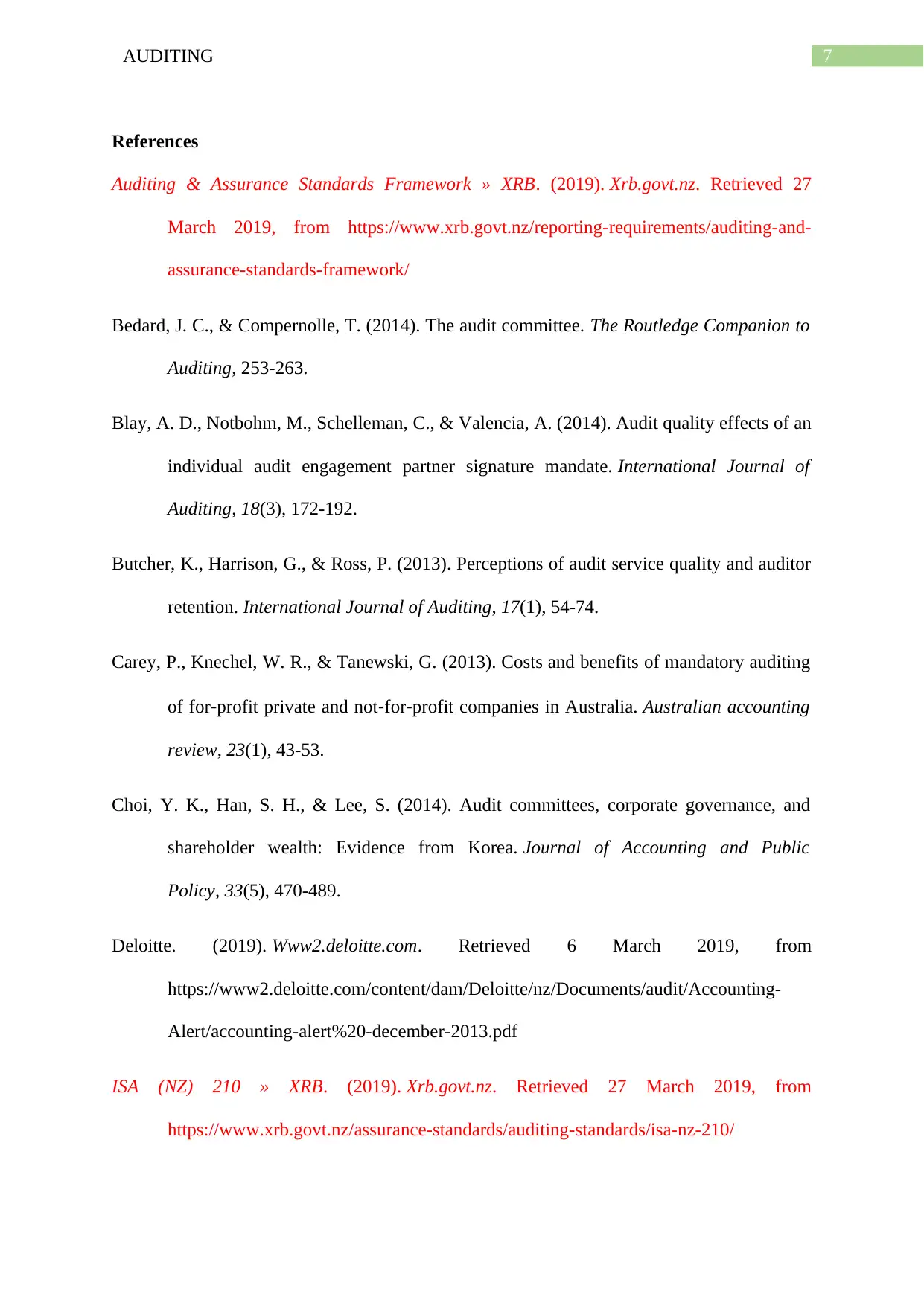
7AUDITING
References
Auditing & Assurance Standards Framework » XRB. (2019). Xrb.govt.nz. Retrieved 27
March 2019, from https://www.xrb.govt.nz/reporting-requirements/auditing-and-
assurance-standards-framework/
Bedard, J. C., & Compernolle, T. (2014). The audit committee. The Routledge Companion to
Auditing, 253-263.
Blay, A. D., Notbohm, M., Schelleman, C., & Valencia, A. (2014). Audit quality effects of an
individual audit engagement partner signature mandate. International Journal of
Auditing, 18(3), 172-192.
Butcher, K., Harrison, G., & Ross, P. (2013). Perceptions of audit service quality and auditor
retention. International Journal of Auditing, 17(1), 54-74.
Carey, P., Knechel, W. R., & Tanewski, G. (2013). Costs and benefits of mandatory auditing
of for‐profit private and not‐for‐profit companies in Australia. Australian accounting
review, 23(1), 43-53.
Choi, Y. K., Han, S. H., & Lee, S. (2014). Audit committees, corporate governance, and
shareholder wealth: Evidence from Korea. Journal of Accounting and Public
Policy, 33(5), 470-489.
Deloitte. (2019). Www2.deloitte.com. Retrieved 6 March 2019, from
https://www2.deloitte.com/content/dam/Deloitte/nz/Documents/audit/Accounting-
Alert/accounting-alert%20-december-2013.pdf
ISA (NZ) 210 » XRB. (2019). Xrb.govt.nz. Retrieved 27 March 2019, from
https://www.xrb.govt.nz/assurance-standards/auditing-standards/isa-nz-210/
References
Auditing & Assurance Standards Framework » XRB. (2019). Xrb.govt.nz. Retrieved 27
March 2019, from https://www.xrb.govt.nz/reporting-requirements/auditing-and-
assurance-standards-framework/
Bedard, J. C., & Compernolle, T. (2014). The audit committee. The Routledge Companion to
Auditing, 253-263.
Blay, A. D., Notbohm, M., Schelleman, C., & Valencia, A. (2014). Audit quality effects of an
individual audit engagement partner signature mandate. International Journal of
Auditing, 18(3), 172-192.
Butcher, K., Harrison, G., & Ross, P. (2013). Perceptions of audit service quality and auditor
retention. International Journal of Auditing, 17(1), 54-74.
Carey, P., Knechel, W. R., & Tanewski, G. (2013). Costs and benefits of mandatory auditing
of for‐profit private and not‐for‐profit companies in Australia. Australian accounting
review, 23(1), 43-53.
Choi, Y. K., Han, S. H., & Lee, S. (2014). Audit committees, corporate governance, and
shareholder wealth: Evidence from Korea. Journal of Accounting and Public
Policy, 33(5), 470-489.
Deloitte. (2019). Www2.deloitte.com. Retrieved 6 March 2019, from
https://www2.deloitte.com/content/dam/Deloitte/nz/Documents/audit/Accounting-
Alert/accounting-alert%20-december-2013.pdf
ISA (NZ) 210 » XRB. (2019). Xrb.govt.nz. Retrieved 27 March 2019, from
https://www.xrb.govt.nz/assurance-standards/auditing-standards/isa-nz-210/
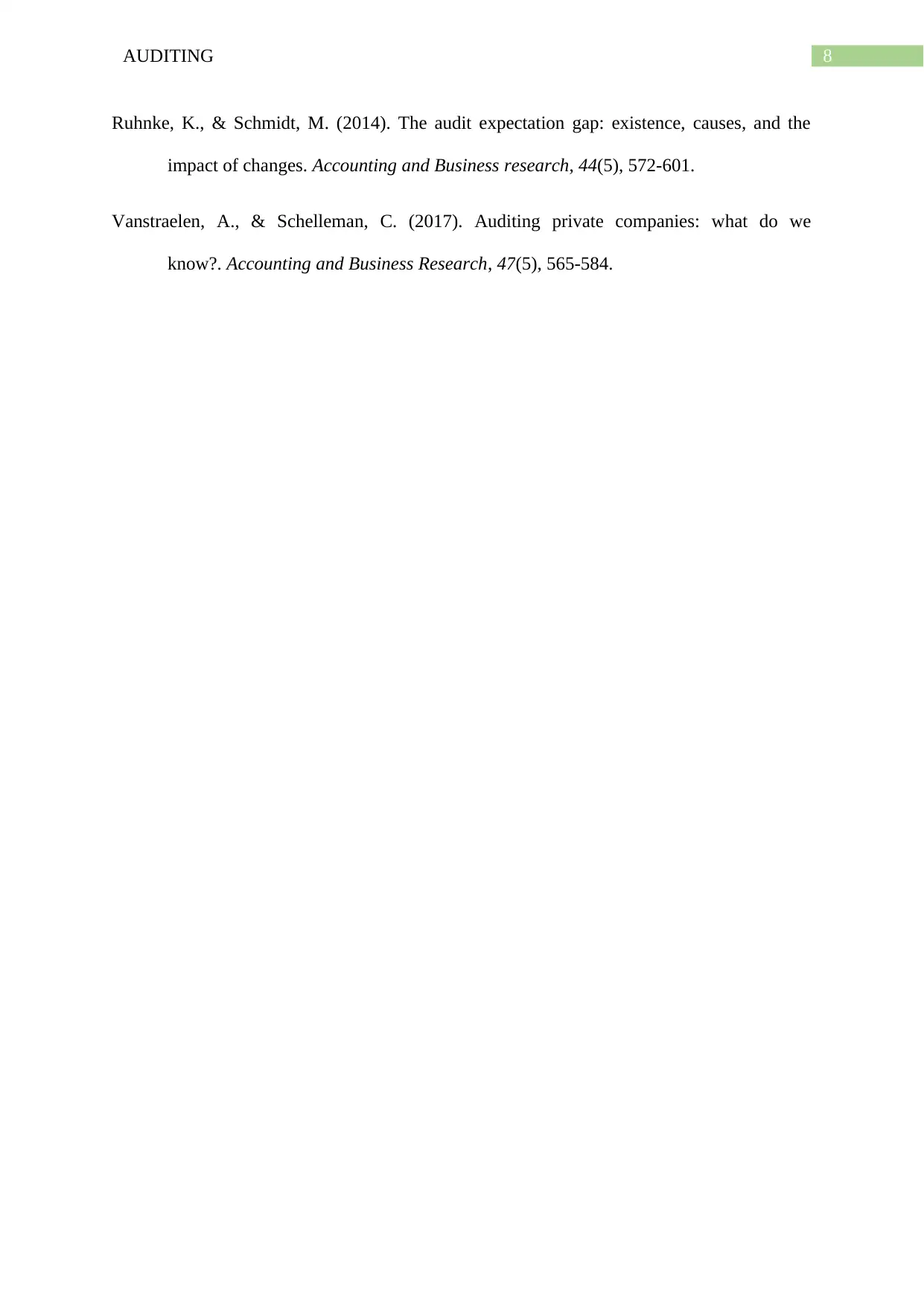
8AUDITING
Ruhnke, K., & Schmidt, M. (2014). The audit expectation gap: existence, causes, and the
impact of changes. Accounting and Business research, 44(5), 572-601.
Vanstraelen, A., & Schelleman, C. (2017). Auditing private companies: what do we
know?. Accounting and Business Research, 47(5), 565-584.
Ruhnke, K., & Schmidt, M. (2014). The audit expectation gap: existence, causes, and the
impact of changes. Accounting and Business research, 44(5), 572-601.
Vanstraelen, A., & Schelleman, C. (2017). Auditing private companies: what do we
know?. Accounting and Business Research, 47(5), 565-584.
⊘ This is a preview!⊘
Do you want full access?
Subscribe today to unlock all pages.

Trusted by 1+ million students worldwide
1 out of 9
Related Documents
Your All-in-One AI-Powered Toolkit for Academic Success.
+13062052269
info@desklib.com
Available 24*7 on WhatsApp / Email
![[object Object]](/_next/static/media/star-bottom.7253800d.svg)
Unlock your academic potential
Copyright © 2020–2026 A2Z Services. All Rights Reserved. Developed and managed by ZUCOL.





